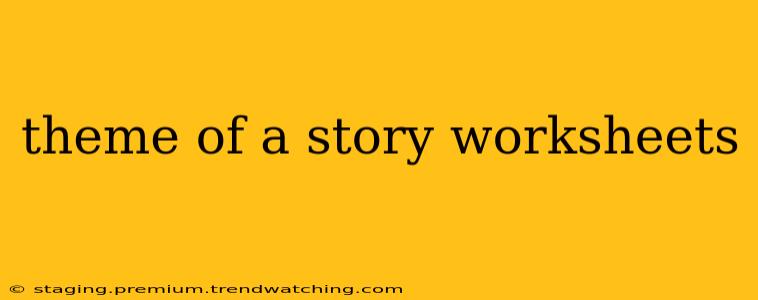Finding and understanding the theme of a story is a crucial skill for any reader, moving beyond simple plot summary to grasp the author's deeper message. This isn't just about identifying the main idea; it's about analyzing the characters' actions, conflicts, and resolutions to uncover the underlying message. These worksheets will help you explore theme in a fun and engaging way, suitable for various age groups and reading levels.
What is Theme? A Quick Review
Before diving into the worksheets, let's refresh our understanding of theme. A theme is the central idea or message the author wants to convey. It's not simply a subject (like love or war), but a statement about that subject (e.g., "Love conquers all" or "War's devastating impact on humanity"). Themes are often implied rather than explicitly stated, requiring readers to infer them from textual evidence.
Worksheet 1: Identifying the Subject and Theme
This worksheet focuses on distinguishing between the subject of a story and its theme. You'll be given several short stories or excerpts, and your task will be to:
- Identify the main subject(s): What are the primary topics or issues explored in the story? (e.g., friendship, courage, loss)
- Determine the theme(s): Based on the events and character development, what statement does the author seem to be making about these subjects? (e.g., "True friendship endures through hardship," "Courage is found in unexpected places," "Loss can lead to unexpected growth.")
Example: A story about a child overcoming their fear of public speaking.
- Subject: Fear, public speaking, self-confidence.
- Possible Theme: Overcoming fear requires courage and perseverance, leading to personal growth.
Worksheet 2: Supporting the Theme with Textual Evidence
This worksheet reinforces the importance of using textual evidence to support your interpretation of a story's theme. You'll be provided with a longer story excerpt and asked to:
- State your interpretation of the theme: What is the central message of the story?
- Identify three specific pieces of textual evidence: Find three quotes or descriptions from the story that directly support your interpretation of the theme. Explain how each piece of evidence supports your claim.
Worksheet 3: Comparing and Contrasting Themes
This worksheet challenges you to analyze multiple stories and compare their themes. You'll receive several short stories or excerpts with different subjects but potentially overlapping themes. Your task will be to:
- Identify the theme of each story.
- Compare and contrast the themes: How are the themes similar or different? What are the common threads? How do the stories explore these themes in unique ways?
- Discuss the author's techniques: How do the authors use character development, plot structure, and setting to convey their chosen themes?
Worksheet 4: Creating Your Own Theme
This worksheet is a creative exercise, allowing you to craft your own story based on a specific theme. You will be given a theme and asked to:
- Develop a story outline: Create a brief plot outline that supports the given theme.
- Create a character sketch: Develop one or two main characters whose actions and conflicts directly relate to the theme.
- Write the beginning of your story: Start writing the beginning of the story, focusing on establishing the setting and introducing the main characters.
Frequently Asked Questions (FAQ)
How can I tell if I've identified the correct theme?
There is often more than one valid interpretation of a story's theme. However, a strong interpretation will be well-supported by textual evidence and consistent with the overall message and tone of the story.
What if a story seems to have multiple themes?
Many stories explore more than one theme. Try to identify the central or most prominent theme, and then consider the supporting or secondary themes.
Are there any resources to help me further understand theme?
Yes, you can find numerous resources online, including literary analysis websites, YouTube videos explaining theme, and books dedicated to literary theory. Many online dictionaries also provide excellent definitions and examples of theme in literature.
By completing these worksheets, you'll sharpen your analytical skills, improve your understanding of literary texts, and become a more perceptive reader. Remember, understanding theme is a process that involves critical thinking, close reading, and careful consideration of the author's intentions.

